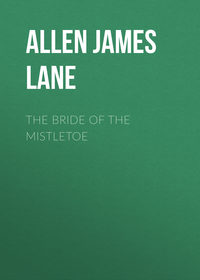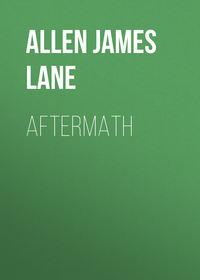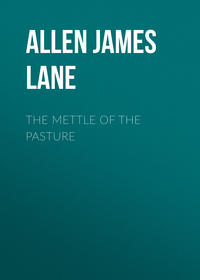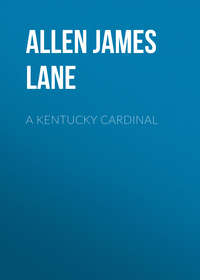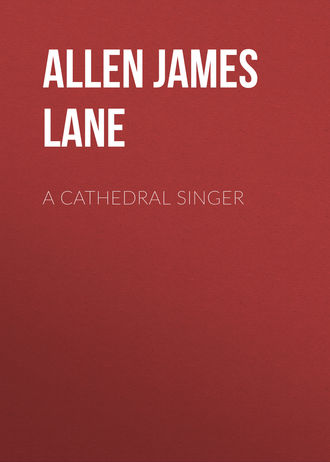 полная версия
полная версияA Cathedral Singer
They started up to get to her. They fought one another to get to her. They crowded around the platform, and tried to hide her from one another's eyes, and knelt down, and wound their arms about her, and sobbed with her; and then they lifted her and guided her behind the screens.
"Now, if you will allow them," he said, when she came out with them, one of them having lent her a veil, "some of these young friends will go home with you. And whenever you wish, whenever you feel like it, come back to us. We shall be ready. We shall be waiting. We shall all be glad."
On the heights the cathedral rises—slowly, as the great houses of man's Christian faith have always risen.
Years have drifted by as silently as the winds since the first rock was riven where its foundations were to be laid, and still all day on the clean air sounds the lonely clink of drill and chisel as the blasting and the shaping of the stone goes on. The snows of winters have drifted deep above its rough beginnings; the suns of many a spring have melted the snows away. Well nigh a generation of human lives has already measured its brief span about the cornerstones. Far-brought, many-tongued toilers, toiling on the rising walls, have dropped their work and stretched themselves in their last sleep; others have climbed to their places; the work goes on. Upon the shoulders of the images of the Apostles, which stand about the chancel, generations of pigeons—the doves of the temple whose nests are in the niches—upon the shoulders of the Apostles generations of pigeons born in the niches have descended out of the azure as with the benediction of shimmering wings. Generations of the wind-borne seeds of wild flowers have lodged in low crevices and have sprouted and blossomed, and as seeds again have been blown further on—harbingers of vines and mosses already on their venerable way.
A mighty shape begins to answer back to the cathedrals of other lands and ages, bespeaking for itself admittance into the league of the world's august sanctuaries. It begins to send its annunciation onward into ages yet to be, so remote, so strange, that we know not in what sense the men of it will even be our human brothers save as they are children of the same Father.
Between this past and this future, the one of which cannot answer because it is too late and the other of which can not answer because it is too soon—between this past and this future the cathedral stands in a present that answers back to it more and more. For a world of living-men and women see kindled there the same ancient flame that has been the light of all earlier stations on that solitary road of faith which runs for a little space between the two eternities—a road strewn with the dust of countless wayfarers bearing each a different cross of burden but with eyes turned toward the same Cross of hope.
As on some mountain-top a tall pine-tree casts its lengthened shadow upon the valleys far below, round and round with the circuit of the sun, so the cathedral flings hither and thither across the whole land its spiritual shaft of light. A vast, unnumbered throng begin to hear of it, begin to look toward it, begin to grow familiar with its emerging form. In imagination they see its chapels bathed in the glories of the morning sun; they remember its unfinished dome gilded at the hush of sunsets. Between the roar of the eastern and of the western ocean its organ speaks of a Divine peace above mortal storm. Pilgrims from afar, known only to themselves as pilgrims, being pilgrim-hearted but not pilgrim-clad, reach at its gates the borders of their Gethsemane. Bowed as penitents, they hail its lily of forgiveness and the resurrection.
Slowly the cathedral rises, in what unknown years to stand finished! Crowning a city of new people, let it be hoped, of better laws. Finished and standing on its rock for the order of the streets, for order in the land and order throughout the world, for order in the secret places of the soul. Majestical rebuker of the waste of lives, rebuker of a country which invites all lives into it and wastes lives most ruthlessly—lives which it stands there to shelter and to foster and to save.
So it speaks to the distant through space and time; but it speaks also to the near.
Although not half risen out of the earth, encumbering it rough and shapeless, already it draws into its service many who dwell around. These seek to cast their weaknesses on its strength, to join their brief day to its innumerable years, to fall into the spiritual splendor of it as out in space small darkened wanderers drop into the orbit of a sun. Anguished memories begin to bequeath their jewels to its shrine; dimmed eyes will their tears to its eyes, its windows. Old age with one foot in the grave drags the other resignedly about its crypt. In its choir sound the voices of children herded in from the green hillside of life's April.
Rachel Truesdale! Her life became one of these near-by lives which it blesses, a darkened wanderer caught into the splendor of a spiritual sun. It gathered her into its service; it found useful work for her to do; and in this new life of hers it drew out of her nature the last thing that is ever born of the mother—faith that she is separated a little while from her children only because they have received the gift of eternal youth.
Many a proud happy thought became hers as time went on. She had had her share in its glory, for it had needed him whom she had brought into the world. It had called upon him to help give song to its message and to build that ever-falling rainbow of music over which human Hope walks into the eternal.
Always as the line of white-clad choristers passed down the aisle, among them was one who brushed tenderly against her as he walked by, whom no one else saw. Rising above the actual voices and heard by her alone, up to the dome soared a voice dearer, more thrilling, than the rest.
Often she was at her window, watching the workmen at their toil as they brought out more and more the great shape on the heights. Often she stood looking across at the park hillside opposite. Whenever spring came back and the slope lived again with young leaves and white blossoms, always she thought of him. Always she saw him playing in an eternal April. When autumn returned and leaves withered and dropped, she thought of herself.
Sometimes standing beside his piano.
Having always in her face the look of immortal things.
The cathedral there on its rock for ages saying:
"I am the Resurrection and the Life."
THE END





